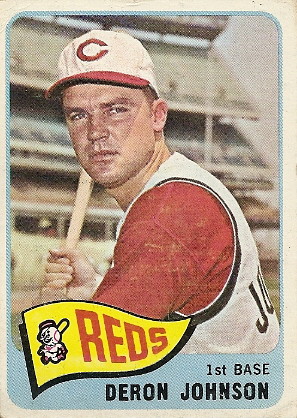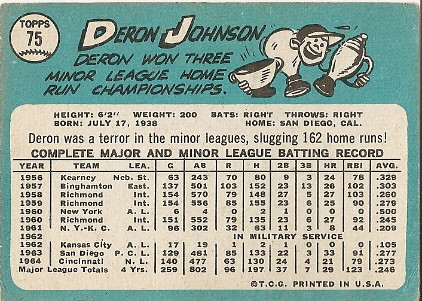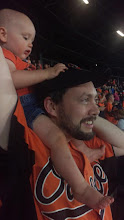
Johnson was yet another young talent who started in the Yankee organization, who must have had some great scouts (and deep pockets, which you already knew). Of course, while the Yanks rolled up World Series appearances, Deron toiled away in the minors, clouting 129 home runs in five years. After just nineteen games in pinstripes, he was traded to the Kansas City Athletics, who essentially functioned as yet another New York affiliate. His career never got untracked in K.C., as he lost a year to military service and battled the Mendoza Line otherwise. In 1963, the A's sold him to the Reds, who kept the powerful infielder in the minors for one more year. Playing in his native San Diego, Johnson clubbed 33 more home runs, and Cincinnati took the hint and brought him up for 1964.
Deron paid immediate dividends for the Reds, hitting 21 longballs in his first full season in the bigs. He teamed with Frank Robinson and Vada Pinson to power the club to a second-place finish, just a game short of pennant-winning St. Louis. Johnson was just getting warmed up: his second shot at N.L. pitching yielded a .287 average, 30 doubles, 32 home runs, and a league-leading 130 RBI. Despite placing fourth in MVP voting, D.J. was not an All-Star, a testament to the occasional dubiousness of measuring a player's worth in All-Star selections. Called upon to shoulder even more of the load following Robinson's trade to Baltimore, Johnson instead slid back, his average, doubles, homers, and RBI dropping each year from 1966 through 1968. He also found himself on the move again, being dealt from the Reds to the Braves and from the Braves to the Phillies.
In Philadelphia, Deron would get his career back on track; his power numbers and batting average improved in three consecutive seasons (1969-1971). He peaked with a career-best 34 home runs and 95 RBI in 1971. After a disappointing and abbreviated 1972 and a slow start to the following year, Johnson was traded to Oakland, where he became one of the first conventional designated hitters: an aging slugger acquired specifically to DH. He fit the bill, blasting 19 dingers and driving in 81 for the World Champion Athletics. The final three years of D.J.'s career lacked that sort of glory, as he put some more stickers on his suitcase (Brewers/Red Sox/White Sox/Red Sox again). In his post-playing career, he coached for five major league clubs (1979-1991) before succumbing to lung cancer at the age of 53.
Fun fact: Deron had three home runs in one game on July 11, 1971. His round-trippers came in each of his first three at-bats, and drove in the Phils' first five runs in an 11-5 win over the Expos. (He grounded into a fielders' choice in his fourth and final trip to the plate.)



RE: The bad-looking modern "vest jerseys":
ReplyDeleteThe old-school ones like Johnson is wearing look more like an NBA jersey (with the red undershirt showing on the shoulders). The new one (in your link) looks like a ladie's garment with its pouffy wide shoulders (as if hiding 1970s-style shoulder pads)!